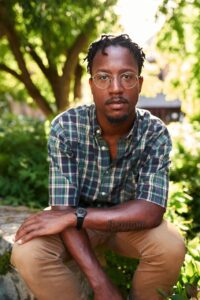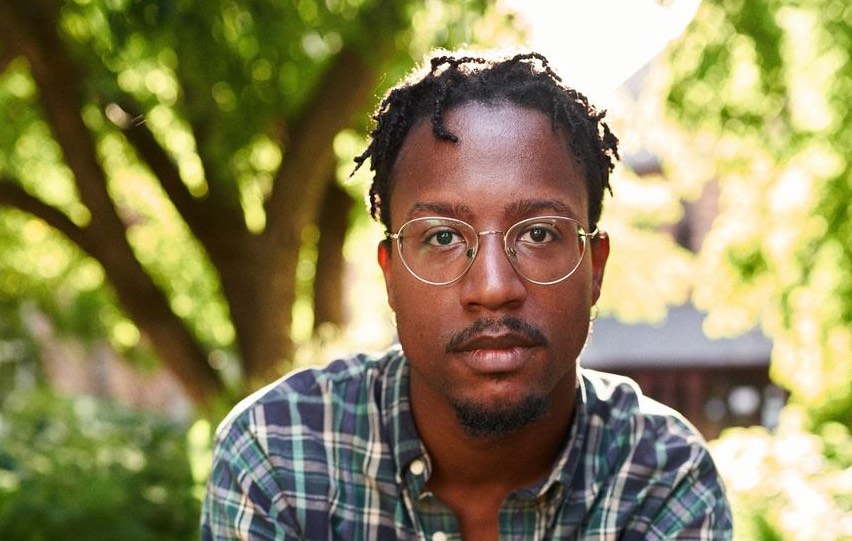matthew charles is a poet, podcast host, and educator. We talk to him about the experience of being a transracial adoptee (TRA), his emergence as a poet and activist, and the importance of self-expression.
In your bio, you use the phrase “racially marooned.” Can you talk about what that choice of words means to you and how it describes the experience of being a transracial adoptee?
The popular term I’ve heard other transracial adoptees use is “racially isolated” but I coined “racially marooned” because I feel it more viscerally evokes a sense of void in regard to lack of racial mirrors. I have a poem I wrote called “Closed Transracial Adoption is | God’s Gift” where I write, “i’m the first landmass that drifted from Pangea / you don’t understand how alone i feel.”
You’ve written that as a child you experienced life as if a veil covered your eyes. What did you mean by that and what happened to cause the veil to drop?
As a transracial adoptee whose body was raised racially marooned, I was acculturated into whiteness, made to believe that there were my kin, and my allegiances. Yet I was also rejected daily by whiteness through micro and macro aggressions. Realizing that even though my body was literally purchased by whiteness I had no purchase in whiteness was an apocalypse, of sorts. It freed me to practice Sankofa—a Ghanaian symbol that means, “to retrieve.” I had to retrieve the Black essence of who I am in order to reorient myself in the world—not as a(n adopted) child of whiteness but as a doubly displaced African.
Hip-Hop was formative for you as an adolescent and you were a performer. What happened that caused you to shift to poetry?
I’d always practiced writing Haikus to sharpen my ability to say a lot with not many words, so in some senses I was already interdisciplinary. However, at 17 when I was recording music in Saint Louis I lost my voice. I’d end up not able to speak for three years. This vocal disability still affects me to this day. It was in that purgatory that I more consciously altered my craft to poetry because I was afraid I’d never be able to perform or tour again.
When you began to express yourself—first in Hip-Hop and later in poetry—did you immediately take transracial adoption as your subject, or did that happen later?
No, I didn’t use rap to talk about myself. I used rap to project a false image. One of the reasons I shifted to poetry was because how I engaged with the genre of Rap felt constricting. I’d felt like I couldn’t be vulnerable. Themes of adoption began appearing in my work as early as 2018 but I didn’t set out to create a body of work with adoption as the central theme until my newest and as of yet unpublished book of poetry, meet me in the clearing.
Did you ever study formally or was Hip-Hop all the education you needed?
I taught myself all of the forms of Creativity that I practice—poetry, rap, essay, memoir.
Is poetry as much a means of survival as an artistic expression?
I wouldn’t be alive today if I didn’t have my art practice. As i write in “To Pimp An Adopted Butterfly,” art is one of my most enduring and longstanding relationships, and it has helped me know myself, and in the process of knowing myself it has saved my life countless times.
Similarly, are poetry and activism synonymous for you? Do you see your artistry as a form of activism?
While I don’t see them as synonymous, my artistry often is laced with activist intent. But the first goal in my creative process is to create something meaningful to me.
In art and in activism, who are your influences? Who are the most important voices among transracial adoptees—poets or otherwise? Who do you listen to? Who do you admire?
When it comes to art I like Lucille Clifton, Hafiz, Jay Electronica, and Joy Oladukun. But I’m not sure who the most important voices are for TRAs. Voices I’ve been most impacted by are Daniel Drennan ElAwar, Rebecca Carroll, and Hannah Jackson Matthews.
Can you tell us about your first book, You Can Not Burn the Sun, and the series of books you have planned?
You Can Not Burn The Sun is a self-published book of poetry I wrote during the 2020 Uprisings about my involvement in the Movement for Black Lives in Madison, Wisconsin. The follow-up is meet me in the clearing, a collection of poems about my life as a transracial adoptee raised racially marooned in Roseburg, Oregon. And book3 is in the works, it’s a memoir. Can’t tell ya the title yet, tho.
You created a podcast, little did u know, to “center the lived experiences, learned and inherited wisdom of transracial adoptees.” Can you say more about how this came about? Did you start this to fill a void in the conversation about adoption?
In January 2021, my big homie Charles Payne told me I should do a podcast for You Can Not Burn The Sun but I was too insecure to pursue that. That was the genesis of the idea of me podcasting. Around August 2021, I realized what I would love to do is create a media platform for transracial adoptees because I wasn’t hearing the kinds of conversations I wanted to hear via podcast. My hope is to make more accessible conversations of race, class, gender, colony, and displacement from a critical adoptee lens.
So far, you’ve posted three episodes with fascinating guests, but you haven’t had a new episode recently. Do you plan to continue and if so, do you have new guests lined up?
Yeah, the next guest is Dr. Daniel ElAwar. I’m very excited about that. Hoping to get Susan Devan Harness on the show too, but we’ll see.
In your introduction to one of your podcast guests, identity reclamation coach Hannah Jackson Matthews, you say that as a result of the reaction to a poem you shared on her platform you realized you weren’t alone in your experience and that it was the first place you felt seen in ways “I’d never dared to show myself.” Can you talk about why it’s important for adoptees to share their voices and tell their stories?
As Black people in the US, we have historically had to explain our existence as oppressed peoples living in a racist society. After 2020, this is happening less so. Yet, as adoptees, the truth of our lived experiences is not as ingrained in the public imagination because the public’s imagination of us is shaped by adoption industry propaganda. First and foremost, sharing our voices is a liberatory act for ourselves because as adoptees we’re often taught not to be critical of adoption—bucking off this expectation empowers us to be more honest with ourselves about ourselves and the world around us. In sharing our voices, we find resonance among other displaced and dispersed peoples, and in that way, sharing our voice becomes an act of building radical community. It is invaluable to be seen and known by the communities we partake in.
matthew charles is the host of little did u know, a podcast that centers the lived experiences—the learned and inherited wisdom—of transracial adoptees. He is also a poet, and his debut poetry collection, You Can Not Burn The Sun (2020), is sold out, so you can’t buy a copy. But you can eagerly anticipate book2. And you should definitely listen to his podcast. You can follow him on Twitter @CantBurnTheSun or Instagram @matthewcharlespoet.
On Venmo @matthewcharlespoet


